

During
his 25 years as a comic book artist Carl Barks was usually very
careful not to show his personal opinions and preferences in his
stories. Still, many of his personal viewpoints can be seen in a
number of his stories. Perhaps the most noticeable - for those
who know a bit about his background doing all sorts of odd jobs -
are the references to his former life. Barks knew a lot about the
jobs he had Donald Duck try; lumberjacking in WDCS267
and chicken farming in WDCS146
are obvious examples.
This page will attempt to show you a few of Barks' personal
viewpoints that sometimes surfaced in his stories. At the same
time it will reveal a tiny fraction of the way he saw the USA.
| LIKES - DISLIKES | |
| Below you will find a small selection of Barks' Likes and Dislikes. They are presented in no special order. Barks' views on the individual subjects are fairly obvious. | |
The Merrill homestead in 1995 Barks was very fond of the art of photography, which was also reflected in a number of stories where Donald Duck was a photographer. In Barks' later years he owned a number of professional cameras that - among other things - were used to take pictures of his paintings at different stages of completion. In 1995, when Barks made a grand tour to visit different members of his family, he stopped by his ancestral home in Oregon where he took numerous photographs of the farmhouse and the surroundings from the highway. The tall poplars surrounding the house were planted when he was a child! |
MOC04 Western Hero Carson McSixgun Barks was never a keen moviegoer although he grew up in the same years the movie industry explosively developed. He was far too busy at his drawing board but the few times he would visit the local cinema, he preferred Western films because of their simple message of good and evil. |
FC0408 The Golden Helmet Barks read few books but he was an avid
reader of The National Geographic Magazine to which he
subscribed for the greater part of his life. He used it
constantly to research objects and landscapes when
drawing his stories. Barks was very impressed with Foster's scenic renderings of nature. At one point he was completely taken by a panel (from October 7th, 1951) showing Valiant standing at a rugged coastline by a ferocious sea, and he decided to make his own version of the same panel for FC0408 The Golden Helmet. |
|
Barks' second marriage (to Clara Balken) ended in a painful divorce in 1951, which gave him a life-long mistrust to greedy, money-grabbing lawyers. The talkative, self-righteous character of Sharky in FC0408 The Golden Helmet was, by his own admission, inspired by the divorce proceedings. Throughout his stories Barks also showed his disdain of professors and scientists filled with hot-air. One ironic example - where a supercilious professor advocates free child upbringing - is seen in WDCS092. Another example derives from the craze in the 1950s when all the newspapers were filled with stories of scientific explorations of many kinds. The laboratories were crammed with what seemed to be sensational discoveries (in obvious attempts to attract the public spotlight) but most of them were better left in the scientists' notebooks. This hysteria inspired Barks to invent Bombastium, a substance of limited use, for U$17 A Cold Bargain. |
Barks was generally interested in the work of different organisations. His main interest was the welfare of animals. One of his favourite charities was 'Wildlife Images', a non-profit North American animal rehabilitation corporation where injured and orphaned animals are cared for until they can be returned to the wild. Barks would occasionally visit their branch near his home in Grants Pass, Oregon. In U$39 A Spicy Tale Barks took a gentle poke at the Peace Corps (Donald and the nephews are delegates for The Tutor Corps): I'm running out of nations which aren't fighting or rioting or committing aggression. So this story's locale was the Jivaro Indian country, which I've used to death, along with their head-shrinking gimmick. |
HDL17 Be Leery of Lake Eerie Barks had strong opinions about the mistreatment of the environment. He once said, Clean air, clean water, clean environment. We think of those things as part of our birthright. They were long ago, before we overran them with our brand of civilization. Now, what have we got? Air so polluted that we have to grind it before it will filter through our gasmasks. Water so undrinkable that it is safer to die of thirst. Environment so littered that we cannot see the ground, and ground so caustic with chemical spill that it eats through the soles of our shoes. Barks mostly campaigned against industrial misuse of the world's ecology in the 1970s. He often commented on the general deterioration of the environment in his Junior Woodchucks stories in the HDL series. Long before the environmentalists 'took over' Barks was attacking man's destruction of nature. In 1957 he wrote U$18 Land of the Pygmy Indians which made it clear that people mistreated their surroundings by thoughtless pollution of air and water. |
|
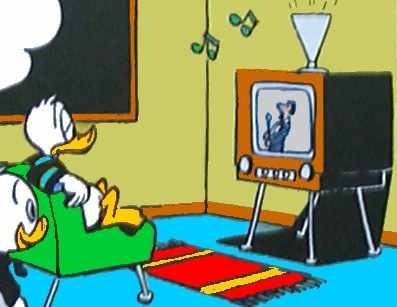 WDCS165 Perry Cougar Barks' taste in music tended to be the works of composers like Steven Foster (Stardust) and singers like Perry Como (Catch A Fallen Star) and Bing Crosby (White Christmas). In WDCS165 he incorporated caricatures of Perry Como and pianist/showman Liberace under the names of Perry Cougar and Lizardaze. |
WDCS286 Painter Fakasso Barks disliked modern art. This should come as no surprise when one thinks of both his and his wife's enormous output of 'straightforward', realistic paintings. Neither of them ever even attempted to produce any type of modern art. In WDCS294 Barks satirized over the subject by letting Gladstone Gander win first prize for a 'painting' consisting of incidental objects glued to the canvas. In WDCS196 Barks showed a group of judges praise a number of modernistic snow sculptures, while they whisper among themselves: What do you suppose the ghastly thing is, anyway? |
| THE POLITICAL SCENE | |
| Barks had strong political opinions. He was registered in The Republican Party and claimed he disliked Democrats. He once said: My own political philosophy is that we've got a pretty good thing going, and we should just leave it damn well alone. But he was always very conscientious not to bring his own political views into his comics as he felt that politics was an uninteresting subject for kids. Still, he commented on a variety of political aspects in some of his comics. Here are a few examples: | |
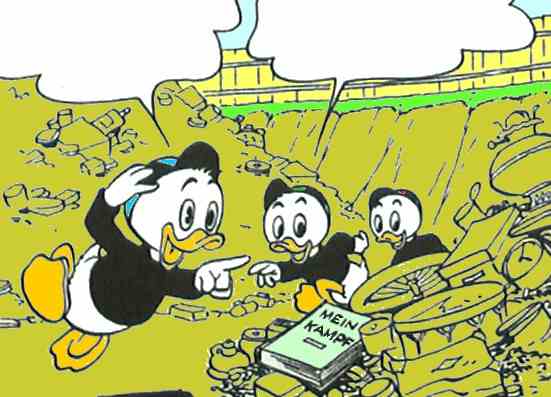 WDCS127 In 1950 Barks drew a 10-pager in WDCS127 in which the nephews try to make Donald an April Fool. In the first panel of the second page there is a book with a cover reading Mein Kampf. This is a book by Adolf Hitler, the initiator of the Second World War. Barks placed the book on the trash dump to make a statement about Hitler who belongs in the lowest of places - the trash. This is the only instance where Barks made a direct political statement in his comics. |
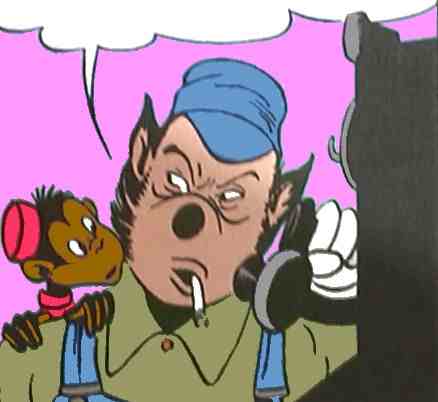 FC0029 Too Many Pets In 1943 Barks rewrote a story about spies and collaborators which were hot subjects during World War 2: I was handed the half-outlined plot and asked to do what I could with it. I merely polished up the other writer's gags and situations, and lengthened the tale, and lo! it didn't look too bad for that spy-conscious era. |
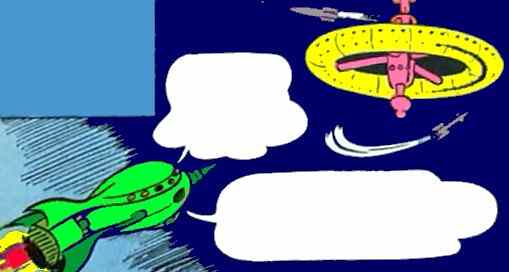 U$29 Island in the Sky By 1960 the Soviet Union had had several manned space flights in orbit and the USA was anxious to do the same, encouraged by the young President Kennedy. Perhaps Barks was swept along in the patriotic fervor that arose in his country in those years and decided to contribute the best way he could - through his ducks! |
|
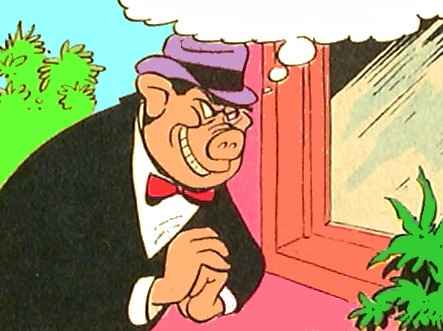 U$57 The Swamp of No Return The so-called Cold War between the United States and the Soviet Union was raging most of the years when Barks was writing his stories. Barks contributed to the common concern about the Communists in a few stories such as U$17 A Cold Bargain, U$57 The Swamp of No Return, and WDCS278 Have Gun, Will Dance. His version of the Russians were called Brutopians and they were shown as pig-faced villains fixed on abolishing people's personal rights and freedom. Barks was undoubtedly displaying the average American's fear of 'the red menace' at the time. |
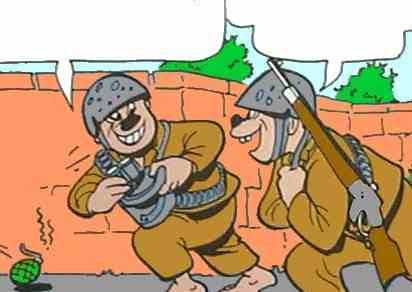 U$64 Treasure of Marco Polo Barks drew a few stories in which real wars were fought either openly or in the background. MOC4 Maharajah Donald, U$25 'The Wishing Well', and WDCS297 Monkey Business are examples. But the most memorable one was U$64 Treasure of Marco Polo, a satirical story from 1966 that has the subject of war as the main theme. It would probably not be fair to state that the story had the then current war in Vietnam as its background. However, it would be fair to be considered as part of Barks' dissociation from war as a whole. |
| THE AMERICANISMS | |
| Barks was always quite particular about his choice of subjects when he wrote a story. He tried not to deliver a comic which would not be understood abroad and therefore tended not to write about typical American subjects. Of course, this could not be completely avoided, and in a number of stories we are given Barks' views on some typical American events: | |
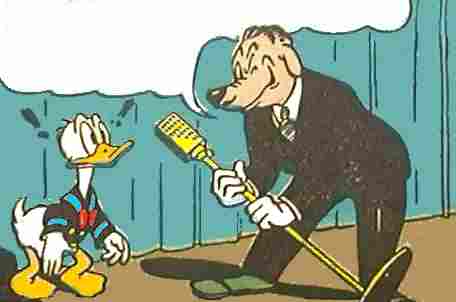 WDCS099 At the time of the story (1948) the radio networks were broadcasting all sorts of silly quiz shows. Barks satirized the phenomenon. |
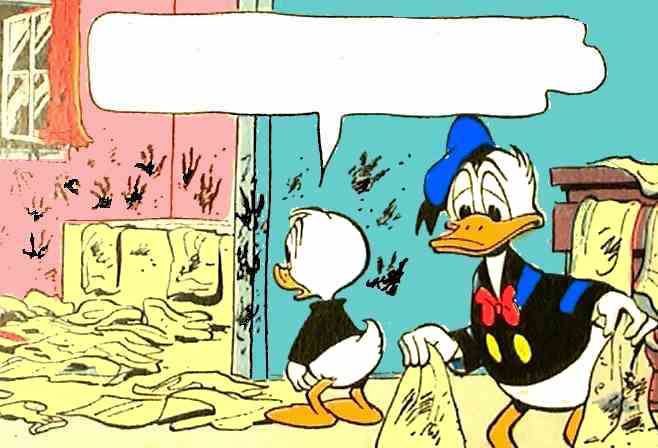 WDCS269 In 1963, the year of the 10-pager in WDCS269, the concepts of drive-ins and motels were relatively new. Barks made a story on the latter theme, in which he delivered a heavy satire on people's treatment of this new development. |
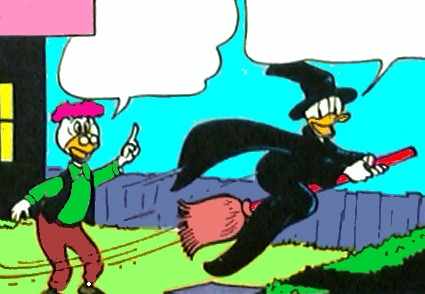 WDCS254 Jet Witch Barks delivered a number of stories in which he placed special American holidays under humorous scrutiny. Examples are WDCS258 Ten-Cent Valentine (Valentine's Day), WDCS243 Turkey Trouble (Thanksgiving), and WDCS254 Jet Witch (Halloween). |
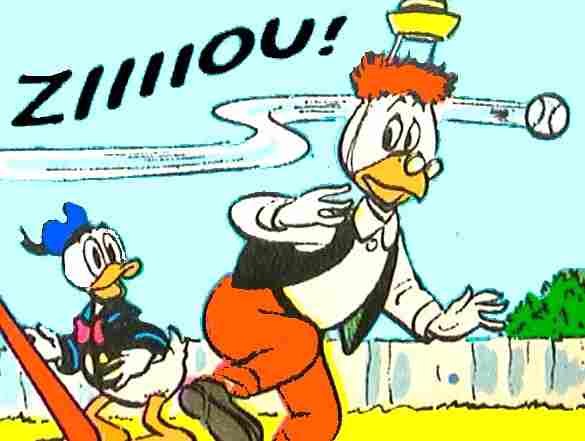 FC1095 The Madball Pitcher Barks also drew a few stories featuring special American sports which were virtually unknown in most parts of the world at the time. Examples are MMA September Scrimmage (Football), FC1055 The TV Babysitter (Bowling), and FC1095 The Madball Pitcher (Baseball). |
FC1055 The Beauty Queen Other types of special events that originated in the USA are the special, elaborate parades and festivities that occur in connection with the celebration of someone special. Examples are WDCS151 'The Easter Parade' (Ticker Tape Parade), U$08 'Candidate for City Treasurer' (Election Campaign), and FC1055 The Beauty Queen (Girls' Competition). |
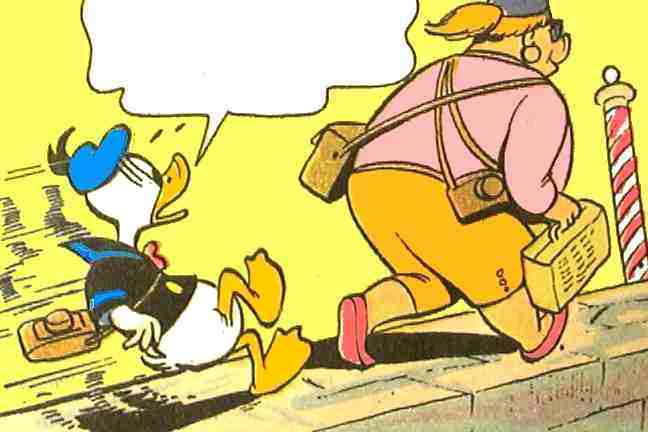 WDCS273 A Duck's Eye View of Europe In 1963 there was a new fad - a new way of taking trips abroad. The general idea seemed to be that groups of Americans would visit as many European countries and cities as they could in the shortest amount of time possible. Barks wrote a biting satire of this phenomenon, which has not yet ceased to exist. |
| http://www.cbarks.dk/THEVIEWPOINTS.htm | Date 2005-03-30 |